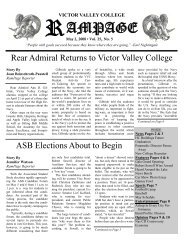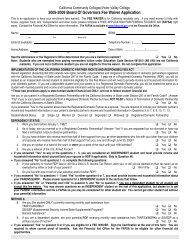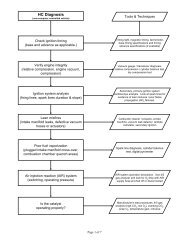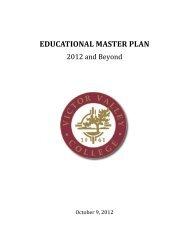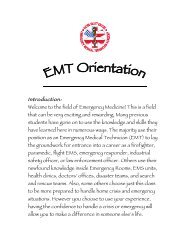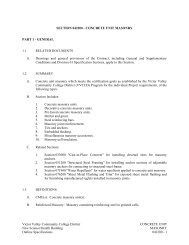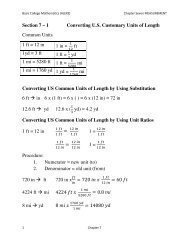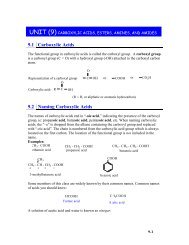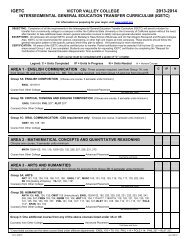Download - Victor Valley College
Download - Victor Valley College
Download - Victor Valley College
You also want an ePaper? Increase the reach of your titles
YUMPU automatically turns print PDFs into web optimized ePapers that Google loves.
PROGRAMS / COURSE DESCRIPTION<br />
BIOL 128 IDENTIFICATION AND STUDY OF<br />
AMPHIBIANS AND REPTILES OF THE MOJAVE AND<br />
ADJACENT MOUNTAINS<br />
Units: 3.0 - 32-36 hours lecture and 48-54 hours<br />
laboratory. CSU. (No prerequisite. Grade Option.)<br />
This course is a survey of the amphibians and reptiles of<br />
the Mojave Desert and adjacent mountains. This course<br />
reviews amphibian and reptile characteristics, origin and<br />
evolution, and classification. This course will also<br />
discuss habitats, behaviors and adaptations of the local<br />
amphibians and reptiles.<br />
BIOL 138 COOPERATIVE EDUCATION<br />
See Cooperative Education listing (1-8 units). CSU<br />
BIOL 149 INDEPENDENT STUDY<br />
54-162 hours lecture.<br />
See Independent Study listing (1-3 units). CSU<br />
BIOL 201 BIOLOGY OF CELLS<br />
Units: 5.0 - 48-54 hours lecture and 96-108 hours<br />
laboratory. CSU, UC. (Prerequisite: MATH 90 or higher<br />
with a grade “C” or better. Prerequisite or co-requisite:<br />
CHEM 100 or CHEM 201 with a minimum grade of ‘C’<br />
or better.)<br />
This course will provide students with a comprehensive<br />
introduction to the biological principles at the cellular<br />
and molecular level. Emphasis will be placed on the<br />
scientific method, molecular biology, biochemistry,<br />
structure and function of cells, cellular reproduction and<br />
Mendelian and molecular genetics. This course is<br />
designed for pre-professional and biology majors but is<br />
open to all students.<br />
BIOL 202 BIOLOGY OF ORGANISMS<br />
Units: 5.0 - 48-54 hours lecture and 96-108 hours<br />
laboratory. CSU, UC. (Prerequisite: MATH 90 or higher<br />
with a grade “C” or better).<br />
This course provides students with a comprehensive<br />
introduction to the diversity of biological organisms.<br />
Emphasis is placed on the origin of life, evolutionary<br />
relationships among groups of organisms and the basic<br />
anatomy and physiology of the major groups of living<br />
organisms and an introduction to the principles of<br />
ecology. Biology majors should also take Biology 201.<br />
BIOL 203 POPULATION AND ENVIRONMENTAL<br />
BIOLOGY<br />
Units: 4.0 - 48-54 hours lecture and 48-54 hours<br />
laboratory. CSU, UC. (No prerequisite.)<br />
This rigorous course is an introduction to the structure<br />
and organization of populations, communities and<br />
ecosystems. Emphasis will be on demography,<br />
population growth, life history traits, extinction, species<br />
interactions and behaviors, ecosystem dynamics and<br />
evolution, as well as selected current environmental<br />
issues. Mathematical modeling, a difficult yet important<br />
aspect of population and community ecology, will also<br />
be addressed. Students will participate in field<br />
laboratories, use statistics to analyze data and compose<br />
scientific papers. This course is designed for biological<br />
science majors, but is open to all students.<br />
BIOL 210 BIOLOGY OF PLANTS<br />
Units: 5.0 - 48-54 hours lecture and 96-108 hours<br />
laboratory. CSU (Prerequisite: BIOL 100 or BIOL H100,<br />
BIOL 201 with a grade of “C” or better.)<br />
This rigorous course will provide students with a<br />
comprehensive introduction to botanical principles from<br />
the cellular and molecular level to the functions of plants<br />
in ecosystems. Emphasis will be placed on plant<br />
molecular biology, biochemistry, and physiology,<br />
especially photosynthesis (C3, C4, and CAM), cell<br />
respiration, and water relations. The structure and<br />
function of plant cells, plant anatomy, plant<br />
reproduction, plant growth and development, Mendelian<br />
and molecular genetics, and plant systematics and<br />
evolution will also be covered. This course is designed<br />
for pre-professional and biology majors, but is open to<br />
all students. The course will stress the use of the<br />
scientific method, critical thinking, and problem-solving<br />
skills. Up to two field trips may be required.<br />
BIOL 211 HUMAN ANATOMY<br />
Units: 5.0 - 48-54 hours lecture and 96-108 hours<br />
laboratory. CSU, UC (UC credit limitation). (Prerequisite:<br />
BIOL 100 or BIOL H100, BIOL 107, or BIOL 201 with a<br />
grade of “C” or better.)<br />
An introduction to the gross and microscopic anatomy of<br />
the human body. Lab includes dissection of cat, sheep<br />
eye, kidney, heart, and larynx. Lab also includes<br />
demonstrations on a human cadaver and assorted<br />
anatomical models. Lecture covers cells, tissues, and<br />
the major human systems such as the integumentary,<br />
skeletal, muscular, nervous, endocrine, cardiovascular,<br />
respiratory, urinary, and reproductive.<br />
BIOL 213 SEXUALLY TRANSMITTED DISEASES<br />
Units: 3.0 - 48-54 hours lecture. CSU (No prerequisite)<br />
This course will provide an understanding of the history<br />
and pathogenesis of the most prominent sexually<br />
transmitted diseases. Emphasis will be placed on the<br />
biological agent, epidemiology, diagnosis and treatment<br />
of the disease. Vaccine development and current<br />
treatments will also be examined.<br />
BIOLOGICAL SCIENCE<br />
2012-2013 <strong>Victor</strong> <strong>Valley</strong> <strong>College</strong> Catalog 137



